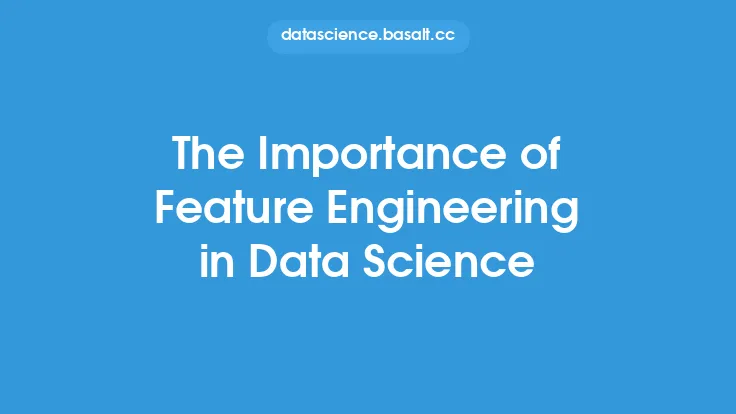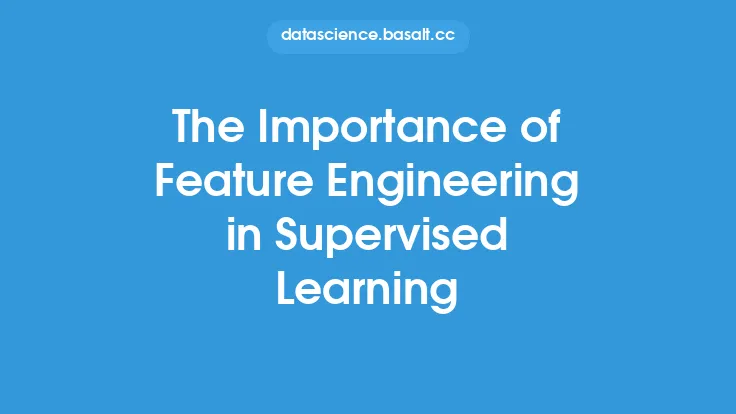Domain knowledge plays a crucial role in data feature engineering, as it enables the creation of relevant and meaningful features that capture the underlying patterns and relationships in the data. Feature engineering is the process of selecting and transforming raw data into features that are more suitable for modeling, and domain knowledge is essential for making informed decisions about which features to create and how to create them.
Introduction to Domain Knowledge
Domain knowledge refers to the expertise and understanding of a particular domain or industry, including the underlying concepts, relationships, and patterns that govern it. In the context of data feature engineering, domain knowledge is used to identify the most relevant and important features that can be extracted from the data. This knowledge can come from various sources, including subject matter experts, industry reports, and existing research.
The Importance of Domain Knowledge in Feature Engineering
Domain knowledge is essential for feature engineering because it allows data scientists to create features that are tailored to the specific problem or task at hand. Without domain knowledge, feature engineering can become a trial-and-error process, where features are created randomly or based on general assumptions. This can lead to the creation of irrelevant or redundant features, which can negatively impact model performance.
Domain knowledge helps data scientists to identify the most relevant features by providing context and understanding of the data. For example, in the healthcare industry, domain knowledge can help data scientists understand the relationships between different medical conditions, treatments, and outcomes. This knowledge can be used to create features that capture these relationships, such as the number of hospitalizations or the presence of certain comorbidities.
Types of Domain Knowledge
There are several types of domain knowledge that can be used in feature engineering, including:
- Conceptual knowledge: This type of knowledge refers to the understanding of the underlying concepts and relationships in the domain. For example, in the finance industry, conceptual knowledge can include understanding the relationships between different financial metrics, such as revenue, expenses, and profitability.
- Procedural knowledge: This type of knowledge refers to the understanding of the procedures and processes used in the domain. For example, in the manufacturing industry, procedural knowledge can include understanding the production process, including the steps involved and the materials used.
- Declarative knowledge: This type of knowledge refers to the understanding of the facts and data used in the domain. For example, in the education industry, declarative knowledge can include understanding the curriculum, including the subjects taught and the learning objectives.
Applying Domain Knowledge in Feature Engineering
Domain knowledge can be applied in feature engineering in several ways, including:
- Feature selection: Domain knowledge can be used to select the most relevant features from the data. For example, in the customer service industry, domain knowledge can be used to select features that are related to customer satisfaction, such as response time and resolution rate.
- Feature creation: Domain knowledge can be used to create new features that capture the underlying patterns and relationships in the data. For example, in the marketing industry, domain knowledge can be used to create features that capture the relationships between different marketing channels, such as social media and email marketing.
- Feature transformation: Domain knowledge can be used to transform existing features into more meaningful and relevant features. For example, in the finance industry, domain knowledge can be used to transform financial metrics, such as revenue and expenses, into more meaningful features, such as profit margin and return on investment.
Challenges and Limitations
While domain knowledge is essential for feature engineering, there are several challenges and limitations to consider. One of the main challenges is the availability of domain knowledge, as it can be difficult to find subject matter experts or access relevant industry reports. Additionally, domain knowledge can be biased or incomplete, which can impact the quality of the features created.
Another challenge is the integration of domain knowledge with machine learning algorithms. While domain knowledge can be used to create meaningful features, it can be difficult to integrate these features with machine learning algorithms, which often require large amounts of data and computational resources.
Best Practices
To overcome the challenges and limitations of using domain knowledge in feature engineering, several best practices can be followed, including:
- Collaboration with subject matter experts: Data scientists should collaborate with subject matter experts to gain a deeper understanding of the domain and identify the most relevant features.
- Use of industry reports and research: Data scientists should use industry reports and research to gain a better understanding of the domain and identify the most relevant features.
- Use of data visualization techniques: Data scientists should use data visualization techniques to explore the data and identify patterns and relationships that can inform feature engineering.
- Use of automated feature engineering techniques: Data scientists should use automated feature engineering techniques, such as feature selection and feature creation, to identify the most relevant features and create new features that capture the underlying patterns and relationships in the data.
Conclusion
Domain knowledge plays a crucial role in data feature engineering, as it enables the creation of relevant and meaningful features that capture the underlying patterns and relationships in the data. By applying domain knowledge in feature engineering, data scientists can create features that are tailored to the specific problem or task at hand, which can improve model performance and lead to better decision-making. While there are challenges and limitations to consider, several best practices can be followed to overcome these challenges and ensure that domain knowledge is used effectively in feature engineering.





